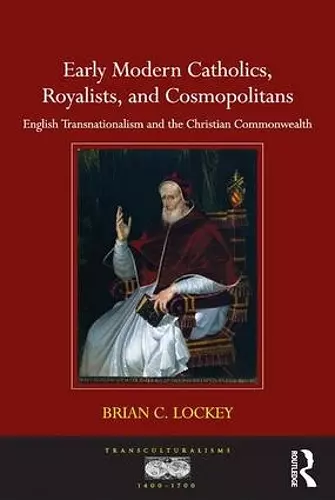Early Modern Catholics, Royalists, and Cosmopolitans
English Transnationalism and the Christian Commonwealth
Format:Hardback
Publisher:Taylor & Francis Ltd
Published:28th Jun '15
Currently unavailable, and unfortunately no date known when it will be back
This hardback is available in another edition too:
- Paperback£40.99(9781138104471)

Early Modern Catholics, Royalists, and Cosmopolitans considers how the marginalized perspective of 16th-century English Catholic exiles and 17th-century English royalist exiles helped to generate a form of cosmopolitanism that was rooted in contemporary religious and national identities but also transcended those identities. Author Brian C. Lockey argues that English discourses of nationhood were in conversation with two opposing 'cosmopolitan' perspectives, one that sought to cultivate and sustain the emerging English nationalism and imperialism and another that challenged English nationhood from the perspective of those Englishmen who viewed the kingdom as one province within the larger transnational Christian commonwealth. Lockey illustrates how the latter cosmopolitan perspective, produced within two communities of exiled English subjects, separated in time by half a century, influenced fiction writers such as Sir Philip Sidney, Edmund Spenser, Anthony Munday, Sir John Harington, John Milton, and Aphra Behn. Ultimately, he shows that early modern cosmopolitans critiqued the emerging discourse of English nationhood from a traditional religious and political perspective, even as their writings eventually gave rise to later secular Enlightenment forms of cosmopolitanism.
"Lockey clearly emphasizes that 'English cosmopolitanism was first and foremost traditional and conservative' (314), although it served as a challenge to the emerging national narratives, and it contained the potential to be stripped of its more obviously conservative manifestations. It could be employed, for example, by writers who were working in the Protestant tradition, who introduced a transnational approach inherited from 'a prohibited ideology' (315). His monograph offers a careful exploration of early modern texts and a thought-provoking read for scholars working in the discipline of history as well as English literature."
- Katy Gibbons, University of Portsmouth, Renaissance Quarterly.
"...it is wonderfully nuanced and never repetitive. More than that, it is resonant in ways which—given the long gestation of academic monographs – its author could hardly have predicted. At a time when most British and American academics find themselves at odds with the nationalistic discourse of their respective countries, ideals of transnational engagement have never seemed more topical or more appealing. One can applaud Lockey’s work for its timeliness."
- Alison Shell, University College London, UK
"Ambitiously spanning two centuries and numerous source texts, Brian Lockey’s Early Modern Catholics, Royalists and Cosmopolitans is a thorough and thought-provoking study into a newly emerging discourse on cosmopolitanism within England in the sixteenth and seventeenth centuries... Well-evidenced and intriguing, Lockey has produced a work that will be approached in years to come from many different disciplines. This book will be invaluable to any critics of religious identities, nation, and selfhood within the early modern period."- Sophie Jane Buckingham, University of East Anglia, Renaissance Studies
"The book as a whole is lively, interesting, and brings a welcome internationalist perspective to the study of early-modern English literature. Throughout, there is a welcome emphasis on Latinity (Osorio, Haddon, Campion) and on translation (Harington, Fanshawe) as parallel vehicles of international communication within Christian Europe... Each of [these chapters] teases out internationalist concerns within the works they cover. At the very least they remind us that even the most Protestant fictions in early modern England were not as straight-forwardly nationalist as recent scholarship might lead us to think." - Paul Arblaster, Saint-Louis University, Brussels, Reformation
"Lockey clearly emphasizes that 'English cosmopolitanism was first and foremost traditional and conservative' (314), although it served as a challenge to the emerging national narratives, and it contained the potential to be stripped of its more obviously conservative manifestations. It could be employed, for example, by writers who were working in the Protestant tradition, who introduced a transnational approach inherited from 'a prohibited ideology' (315). His monograph offers a careful exploration of early modern texts and a thought-provoking read for scholars working in the discipline of history as well as English literature." Katy Gibbons, University of Portsmouth, Renaissance Quarterly.
"Lockey’s book is an important one that, in its pairing of canonical texts with less- studied texts from both England and the Continent, makes a valuable contribution to current conversations about religion, national identity, and political culture in early modern Europe." - Laurie Ellinghausen, Journal for Early Modern Cultural Studies
"Early Modern Catholics, Royalties and Cosmopolitans powerfully reveals that cosmopolitanism is a much earlier phenomenon than seventeenth-and-eighteenth century critics have suggested. This is a well-argued and innovative book, generous in its attention to detail and its concern to establish clarity of purpose for its readership. Lockey ranges across genres, geograhies, and centuries with eloquent ease, alert to both the telling detail and the killing point. This is a book that will be invaluable to early modern academics interested in nation, religion, and identity formation, broadly conceived. It is also a book of enduring and impressive scholarship, as well as a very good read." - Claire Jowitt, University of East Anglia, The Sixteenth Century Journal
ISBN: 9781409418719
Dimensions: unknown
Weight: 880g
388 pages